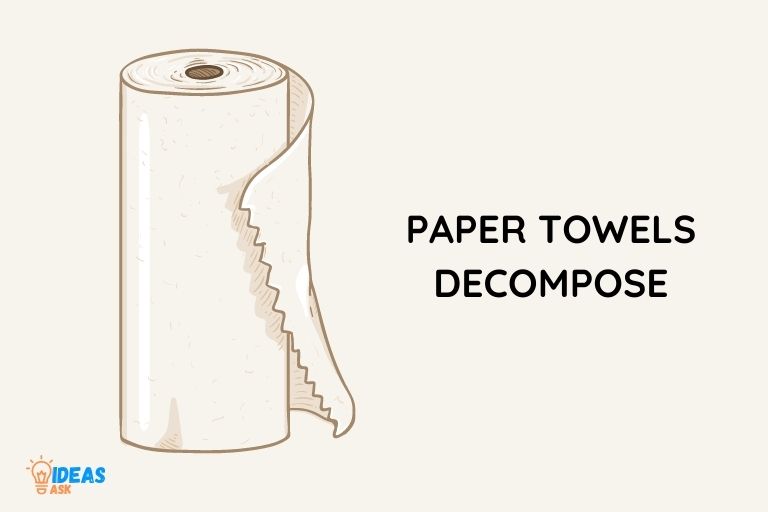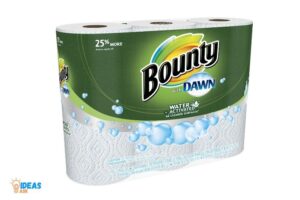Do Paper Towels Decompose? Yes!
Yes, paper towels decompose, but the process can vary in time depending on environmental factors.
Paper towels are made from plant fibers, which are biodegradable materials. This means that they can decompose over time when exposed to microorganisms, such as bacteria and fungi.
However, the decomposition rate depends on factors like the composition of the paper towel, environmental conditions, and the presence of microorganisms.
Paper towels decompose because they are created from plant materials like wood pulp or cotton, which break down under the right conditions.
The decomposition process is a natural occurrence, having microorganisms break down the fibers into simpler substances.
When paper towels are exposed to moisture and warmth, it creates an ideal environment for these microorganisms to thrive, speeding up the decomposition process.
To further help the process along, consider composting used paper towels to provide an even more suitable environment for decomposition.
Decomposition of Paper Towels: 5 Factors & Decomposition Rate
| Factor | Description | Decomposition Rate |
|---|---|---|
| Material | Paper towels are made from cellulose fibers, primarily sourced from trees. | Cellulose in paper towels decomposes at varying rates, ranging from a few weeks to several months. |
| Environment | Environmental conditions such as temperature, moisture, and presence of microorganisms affect decomposition. | In ideal conditions (warm, moist, and rich in microorganisms), decomposition can occur in as little as 2-4 weeks. In colder, drier environments, decomposition may take longer. |
| Thickness | The thickness and density of paper towels influence their degradation time. | Thicker, more dense paper towels may take longer to decompose than thinner ones. |
| Chemical Additives | Some paper towels contain chemicals, such as bleach or dyes, which may slow down decomposition. | Chemical-free paper towels will decompose faster than those with additives. |
| Composting | Composting accelerates decomposition by ensuring optimal moisture and microorganism levels. | Paper towels in a well-maintained compost pile can decompose in just a few weeks. |
Key Takeaway

Five Fascinating Facts About the Decomposition of Paper Towels
What Happens When You Throw Paper Towels Away?
Do paper towels decompose: what happens when you throw paper towels away?
We often use paper towels for cleaning spills, wiping surfaces, and drying our hands. However, have you ever wondered what happens when you dispose of them?
Let’s explore the decomposition process of paper towels, their difference from regular paper, and their environmental impact.
Discuss The Decomposition Process Of Paper Towels
When paper towels are discarded, they undergo a natural process of decomposition. The time taken for decomposition depends on several factors such as the amount of water and oxygen available in the environment.
- On average, it takes two to four weeks for paper towels to decompose in ideal conditions.
- The decomposition process creates methane gas, a potent greenhouse gas that contributes to global warming.
- Paper towels release carbon dioxide when incinerated, contributing to air pollution.
Explain How Paper Towels Differ From Regular Paper In Terms Of Decomposition
Paper towels are different from regular paper in terms of composition and processing. They are usually made from a blend of softwood and hardwood fibers. This makes them more absorbent and durable than regular paper.
- Paper towels are often treated with chemicals to improve their strength and absorbency, which affects their decomposition rate.
- They are not recyclable due to their shorter fibers, making them a single-use item.
- Regular paper decomposes faster than paper towels because it is usually made of higher quality fibers.
Mention The Environmental Impact Of Paper Towels
The production, use and disposal of paper towels have a significant impact on the environment. Adopting eco-friendly alternatives can help mitigate this impact.
- The production of paper towels contributes to deforestation and habitat loss.
- Paper towels are a single-use item, leading to excess waste in landfills and increasing the amount of methane gas released.
- Switching to cloth towels or air dryers can help reduce waste and carbon emissions.
Understanding the decomposition process of paper towels, their difference from regular paper, and their environmental impact is crucial for making sustainable and eco-friendly decisions. By doing our part in reducing waste, we can protect our environment for future generations.
How Long Does It Take For Paper Towels To Decompose?
Factors Affecting The Decomposition Process Of Paper Towels
The decomposition process of paper towels can be affected by several factors, including:
- Type of paper towel: Some paper towels are designed to be more durable and resist breaking down, which means they take longer to decompose than others.
- Humidity: High humidity can cause paper towels to break down more quickly.
- Temperature: Warmer temperatures can also speed up the decomposition process.
- Microorganisms: Certain microorganisms naturally present in the environment can help break down paper towels.
- Chemicals: Paper towels that have been treated with chemicals may take longer to decompose.
Time It Takes For Different Types Of Paper Towels To Decompose
The time it takes for paper towels to decompose can vary depending on the type of paper towel.
Here are some estimates:
- Standard paper towels: These can take anywhere from two weeks to a month to decompose.
- Recycled paper towels: Since these are made from already-used paper, they can take longer to break down, usually around one to six months.
- Bamboo paper towels: Made from fast-growing, renewable bamboo, these can take around two to four months to decompose.
- Cloth towels: These are not disposable and can be used repeatedly, making them the most environmentally friendly option.
Importance Of Properly Disposing Paper Towels
Proper disposal of paper towels is important for reducing waste and keeping the environment clean.
Here are some tips for disposing of paper towels:
- Use reusable cloth towels whenever possible to reduce waste.
- If you do use disposable paper towels, make sure to put them in the trash, not recycling.
- Do not flush paper towels down the toilet, as they can cause plumbing issues and harm the environment.
- Look for paper towels made from recyclable materials to reduce your environmental footprint.
Remember, every small change you make to reduce waste and properly dispose of paper towels can have a big impact on the environment.
Can You Compost Paper Towels?
What Is Composting And How Does It Work?
Composting food scraps and other organic materials is a process that harnesses the natural cycle of decomposition to create a nutrient-rich soil amendment.
By providing an environment that encourages the work of microbes and other small organisms, composting speeds up the natural breakdown of organic matter.
The resulting material can be mixed into soil to improve soil health, retain moisture, and provide nutrients for plants.
Yes, it is possible to compost paper towels, as long as they meet certain conditions. Paper towels should only be composted if they are free of chemical additives, such as bleach or synthetic fibers like polyester.
Additionally, paper towels that have come into contact with meat, dairy, or oils should not be composted due to the potential for attracting pests and creating foul odors.
Benefits Of Composting Paper Towels
Composting paper towels can benefit the environment in several ways, including:
- Reducing waste in landfills: By composting paper towels, you can help divert biodegradable waste from landfills, where it can generate harmful methane gases.
- Creating nutrient-rich soil: Composted paper towels can add a carbon-rich component to soil, helping to improve soil structure and plant growth.
- Saves money: Composting is a cheaper alternative to buying fertilizers and soil amendments.
Overall, composting paper towels is a sustainable way to manage biodegradable waste and create a nutrient-rich soil amendment.
With care and attention, you can turn your leftover organic materials, including paper towels, into a valuable resource for your garden.
Alternative Options To Paper Towels
Discuss Alternative Options To Paper Towels
When it comes to cleaning up messes, paper towels seem like the easy choice. However, with the environmental impact that comes with their production and disposal, it’s important to consider alternatives that are both efficient and sustainable.
Here are some options you can consider:
- Cloth towels: Using cloth towels instead of paper towels is an excellent way to reduce waste. They can be washed and reused, making them a more environmentally-friendly option. Plus, they’re more durable and can be used for longer periods, saving you money in the long run.
- Sponge: A sponge is another great option for cleaning up messes. They’re easy to find and can be used for a variety of purposes. You can use them to wipe up spills, clean dishes or wipe surfaces. They are also washable, which makes them reusable.
- Microfiber cloths: Microfiber cloths are a great option for those looking for a more effective alternative to paper towels. They work by grabbing and holding onto dirt and debris, making them perfect for cleaning surfaces. They are also washable, which means they can be used multiple times.
Highlight The Environmental Benefits Of Using These Alternatives
Aside from being more sustainable, switching to alternative options for paper towels can also help reduce waste and minimize your environmental impact.
Here are a few environmental benefits to consider:
- Reduced waste: One of the most significant environmental benefits of using alternative options over paper towels is reducing the amount of waste we produce. By using reusable towels or cloths, we can minimize the number of times we need to throw out used paper towels, and thus, decrease the amount of waste that ends up in landfills.
- Resource conservation: The production and disposal of paper towels use valuable resources such as water, trees, and energy. By choosing sustainable alternatives, we can conserve these resources and minimize our ecological footprint.
Encourage Readers To Make The Switch To More Sustainable Options
By making small changes in our daily lives, we can make significant progress in reducing our overall environmental impact.
By switching to more sustainable alternatives like cloth towels, sponges, and microfiber cloths, we can reduce waste, conserve resources, and ultimately protect our planet.
Consider making the switch to more sustainable options today and do your part in creating a cleaner, healthier planet for future generations.
FAQ About Decomposition of Paper Towels
Do Paper Towels Decompose In Landfills?
Yes, they decompose, but it can take up to 2-4 weeks or longer in anaerobic conditions.
Can Paper Towels Be Composted?
Yes, paper towels can be composted in a home composting system since they are biodegradable.
Are Paper Towels Recyclable?
Yes, paper towels can be recycled if they are not contaminated with food waste or chemicals.
How Long Does It Take For Paper Towels To Decompose?
It can take up to 2-4 weeks or longer in anaerobic conditions for paper towels to decompose.
Conclusion
Now that we have discussed different aspects of paper towels and their ability to decompose, it is clear that they might not be as eco-friendly as we thought. The fact that they take months or even years to break down and release harmful greenhouse gases in the process is alarming.
However, there are alternatives we can consider, such as using reusable towels or choosing paper towels that are made of recycled materials and are bleach-free. Also, recycling paper towels can reduce the negative impacts on the environment. As a society, we must consider our consumption habits and be mindful of how we treat the environment.
By making small changes in our daily routine, we can collectively make a significant impact on reducing waste and preserving our planet. Together, let’s make a commitment to take care of our surroundings for the sake of our future generations.






